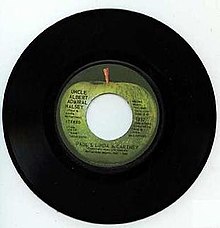
Paul McCartney and Wings, often billed simply as Wings, were an English-American rock band formed in 1971 in London by former Beatles bassist and singer Paul McCartney, his wife Linda McCartney on keyboards, session drummer Denny Seiwell, and former Moody Blues guitarist Denny Laine. Wings were noted for their commercial successes, musical eclecticism and frequent personnel changes; going through three lead guitarists and four drummers. However, the core trio of the McCartneys and Laine remained intact throughout the group's existence.

"The Long and Winding Road" is a song by the English rock band the Beatles from their 1970 album Let It Be. It was written by Paul McCartney and credited to Lennon–McCartney. When issued as a single in May 1970, a month after the Beatles' break-up, it became the group's 20th and last number-one hit on the Billboard Hot 100 chart in the United States.

"Too Many People" is a song by Paul McCartney and his wife Linda McCartney, from the 1971 album Ram. The song was issued as the B-side of the "Uncle Albert/Admiral Halsey" single, and was also included on The 7" Singles Box in 2022.
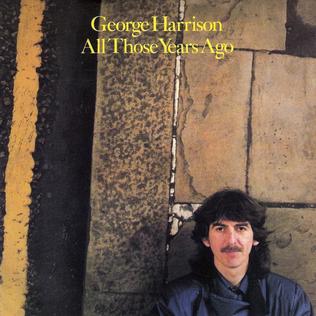
"All Those Years Ago" is a song by the English rock musician George Harrison, released in May 1981 as a single from his ninth studio album Somewhere in England. Having previously recorded the music for the song, Harrison tailored the lyrics to serve as a personal tribute to his former Beatles bandmate John Lennon, following the latter's murder in 1980. Ringo Starr is featured on drums, and Paul McCartney overdubbed backing vocals onto the basic track. The single spent three weeks at number 2 on the US Billboard Hot 100, behind "Bette Davis Eyes" by Kim Carnes, and it peaked at number 13 on the UK Singles Chart. It also topped Canada's RPM singles chart and spent one week at number 1 on Billboard's Adult Contemporary listings.

Ram is the only studio album credited to the husband-and-wife music duo Paul and Linda McCartney, and the former’s second album post-Beatles. Released on 17 May 1971 by Apple Records, it was recorded in New York with guitarists David Spinozza and Hugh McCracken, and future Wings drummer Denny Seiwell. Three singles were issued from the album: "Uncle Albert/Admiral Halsey", "The Back Seat of My Car" and "Eat at Home". The recording sessions also yielded the non-album single "Another Day".

Wild Life is the debut studio album by the British-American rock band Wings and the third studio album by Paul McCartney after the breakup of the Beatles. The album was mainly recorded in seven sessions between 24 July and 4 September 1971, at EMI Studios by McCartney, his wife Linda, session drummer Denny Seiwell, whom they had worked with on the McCartneys' previous album Ram, and guitarist Denny Laine, formerly of the English rock band the Moody Blues. It was released by Apple Records on 7 December in the UK and US, to lukewarm critical and commercial reaction.
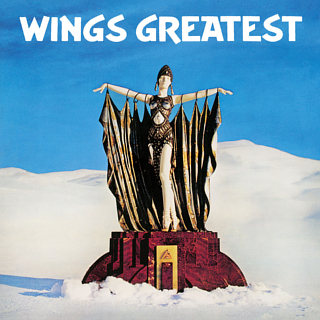
Wings Greatest is a 1978 compilation album by the British–American rock band Wings. It was the band's last release through Capitol in the US. The album is notable as being the first official retrospective release from Paul McCartney's post-Beatles career.
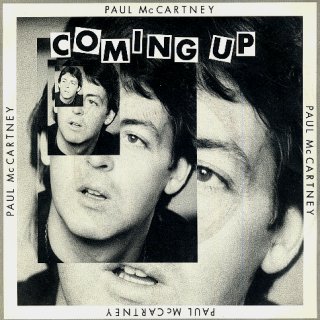
"Coming Up" is a song written and performed by the English rock musician Paul McCartney, released as the opening track on his second solo studio album McCartney II (1980). Like other songs on the album, the song has a synthesised sound, featuring sped-up vocals created by using a vari-speed tape machine. McCartney played all instruments.
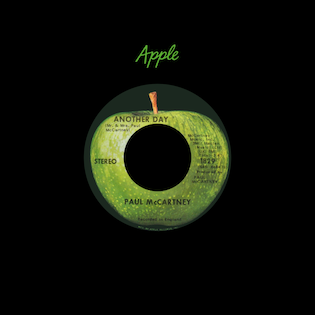
"Another Day" is a song by English rock musician Paul McCartney that was released as the A-side of a non-album single in February 1971. It was his debut single as a solo artist following the Beatles break-up in 1970. McCartney credited his wife Linda as a co-writer on the song, triggering legal action from ATV on behalf of the publishing companies Northern Songs and Maclen Music. The lyrics describe the daily routine of a lonely woman, using an observational style similar to McCartney's narrative in the 1966 ballad "Eleanor Rigby".

"The Back Seat of My Car" is a song written by Paul McCartney, released as the closing track of his and his wife Linda's 1971 album, Ram. Several months later, it was released as a single in the UK, peaking at number 39. The song modulates stylistically between a sweeping piano-and-orchestra ballad similar to McCartney's "The Long and Winding Road" and upbeat rock sections before ending in a raucous and passionate finale.

"Give Ireland Back to the Irish" is the debut single by the British–American rock band Wings that was released in February 1972. It was written by Paul McCartney and his wife Linda in response to the events of Bloody Sunday, on 30 January that year, when British troops in Northern Ireland shot dead thirteen civil rights protestors. Keen to voice their outrage at the killings, Wings recorded the track two days later at EMI Studios in London. It was the band's first song to include Northern Irish guitarist Henry McCullough.

"My Love" is a song by the British–American band Paul McCartney and Wings that was first released as the lead single from their 1973 album Red Rose Speedway. It was written by Paul McCartney as a love song to his wife and Wings bandmate Linda. The single marked the first time that McCartney's name appeared in the artist credit for a Wings record, after their previous releases had been credited to Wings alone. Released on 23 March 1973, the song topped the Billboard Hot 100 chart in the US for four weeks and peaked at number 9 on the UK Singles Chart. The single was viewed as Wings' first significant success in the US and helped Red Rose Speedway achieve commercial success.
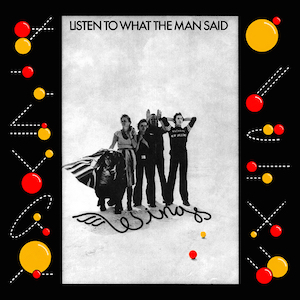
"Listen to What the Man Said" is a hit single from Wings' 1975 album Venus and Mars. The song featured new member Joe English on drums, with guest musicians Dave Mason on guitar and Tom Scott on soprano saxophone. It was a number 1 single on the Billboard Hot 100 in the US the week of July 19, 1975 and reached number 1 in Canada on the RPM National Top Singles Chart. It also reached number 6 in the UK, and reached the top ten in Norway and New Zealand and the top twenty in the Netherlands. The single was certified Gold by the Recording Industry Association of America for sales of over one million copies.

"Letting Go" is a song credited to Paul and Linda McCartney and originally released by Wings on their 1975 album Venus and Mars. The song was remixed and released as a single on 4 October 1975 in the United States, and on 18 October 1975 in the United Kingdom. The song peaked at number 41 in the UK, 41 on the Cash Box Top 100 and number 39 on the Billboard Hot 100.
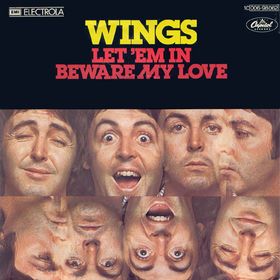
"Let 'Em In" is a song by Wings from their 1976 album Wings at the Speed of Sound. It was written and sung by Paul McCartney and reached the top 3 in the United Kingdom, the United States and Canada. It was a No. 2 hit in the UK; in the U.S. it was a No. 3 pop hit and No. 1 easy listening hit. In Canada, the song was No. 3 for three weeks on the pop chart and No. 1 for three weeks on the MOR chart of RPM magazine. The single was certified Gold by the Recording Industry Association of America for sales of over one million copies. It can also be found on McCartney's 1987 compilation album, All the Best! A demo of the song, featuring Denny Laine on lead vocal, was included as a bonus track on the Archive Collection reissue of Wings at the Speed of Sound.

"Oh Woman, Oh Why" is a song written by English musician Paul McCartney, first released on the Apple Records label in February 1971 as the B-side to McCartney's debut single as a solo artist, "Another Day".
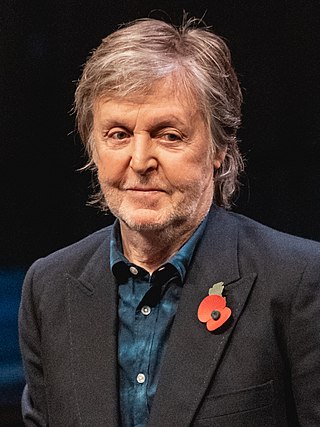
Sir James Paul McCartney is an English singer, songwriter and musician who gained worldwide fame with the Beatles, for whom he played bass guitar and shared primary songwriting and lead vocal duties with John Lennon. One of the most successful composers and performers of all time, McCartney is known for his melodic approach to bass-playing, versatile and wide tenor vocal range, and musical eclecticism, exploring genres ranging from pre–rock and roll pop to classical, ballads, and electronica. His songwriting partnership with Lennon is the most successful in modern music history.

"Little Woman Love" is a Wings song released as the B-side of the non album single "Mary Had a Little Lamb" on 12 May 1972 by Apple Records.
Denny Seiwell is an American drummer and a founding member of Wings. He also drummed for Billy Joel and Liza Minnelli and played in the scores for the films Waterworld, Grease II, and Vertical Limit. His drumming was used in TV shows such as Happy Days and Knots Landing.
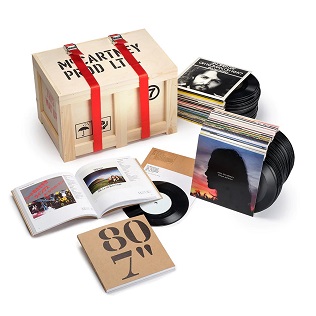
The 7" Singles Box Set is a box set by Paul McCartney released in December 2022 containing 80 seven-inch vinyl singles originally released between 1971 and 2022. The box set was packaged in a wooden crate manufactured in the United Kingdom and limited to only 3000 units worldwide. The box set sold out upon announcement by McCartney. It was also made available on various digital platforms.
